Free Shipping on orders of $49+ | Signup for Direct Rewards
Free Shipping on orders of $49+ | Free Store Pickup | Signup for Direct Rewards
Free Shipping on orders of $49+ | Signup for Direct Rewards
Free Shipping on orders of $49+ | Free Store Pickup | Signup for Direct Rewards

An ocean dweller near and dear to our hearts, the octopus captivates and entrances us every time we encounter one. If you’ve ever come across an octopus in their natural habitat, it’s highly likely it was alone. Most of these 8-arm sea creatures prefer a solitary life, tend to be a bit shy, and are easily chased away by even the most well-meaning on-looker. Not really surprising since they’re on their own from the time they hatch.
This is an interesting question with a very interesting answer. Most octopus live around 3 to 5 years with a few species having a lifespan as short as 5 months. When octopuses reach adulthood, the male seeks out his mate and, once the male impregnates a female, he wanders off to die on his own within a few weeks. The female, after about 40 days in some species, finds a safe place to attach strings of her fertilized eggs (sometimes up to 100,000 eggs). This safe place is usually a den, under an overhang, or even in the crevice of a rock.
The octopus mom then sets about caring for her eggs by aerating, cleaning, and oxygenating them. Requiring constant care, the female octopus doesn’t stop to feed nor tend to her own needs.
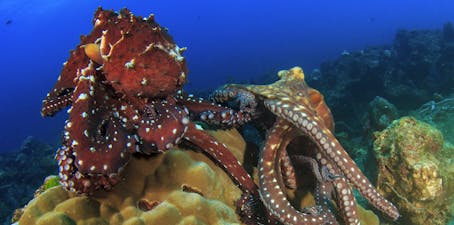
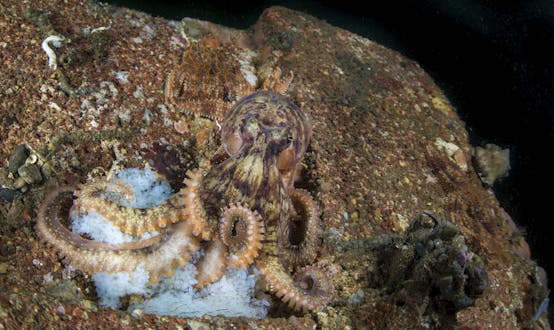
As the eggs grow and develop, the mom starts to fade, becoming weak and susceptible to lesions as the breakdown of cellular function sets in. Degenerating, this self-sacrificing mom continues to care for and protect her eggs until she dies.
By the time the eggs hatch, which is usually right about the time mom dies, mom and dad are both gone and these baby octopuses are left to fend for themselves. Some species hatch as fully formed, fully functioning octopuses while most hatch in a larvae-type state that then develop into the octopuses we know and love. Though it is interesting to note that the octopuses do not go through the typical metamorphosis we find in other mollusc larvae. Instead, they go from the larvae state growing right into their adult bodies.
Masters of disguise, the octopus is equipped with the ability to not only change the color of its skin to match the environment, but some species can alter the texture of their skin as well. And if you get the chance to see it, your regulator just might drop out of your mouth as you watch in wild wonder…the changes are so fast, it takes our mind a minute to process what is happening.
Another well known tactic is the ink cloud an octopus shoots out as it propels itself the opposite direction. Thought to distract or stun the predator, giving the octopus a chance to get away, the ink is expelled as it flees the scene. Additionally, the ink is thought to confuse the olfactory sensors in some ocean dwellers so that those animals who hunt by smell have trouble finding where the octopus went.
Did you know that the mimic octopus is able to copy the shape and behavior of other ocean dwellers as a defense tactic? This species is best known for disguising itself as a sea snake, lionfish, and a sole fish. Though this shape shifter is typically known for using its mimicry to avoid predators, they have also been known to use the same tactics to lure prey.
Now some octopuses have been filmed relying on other tactics for defense…and if you get the chance to see them up to their shenanigans, you might just start laughing.
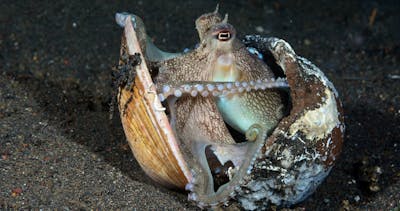
The veined octopus, also called the coconut octopus, has been caught collecting coconut shells, and in some cases abandoned sea shells. It picks these shells up and takes them along so that when necessary, it can enclose the shells around itself for protection. Relying heavily on the tactic we employed as small children - if you can’t see me, I’m not here. It didn’t work for us, but seems to work out quite nicely for these octopus.
Another species of octopus has learned how to tuck all but two of its arms up underneath itself and scurry across the ocean floor on two…arms. Watching the video cracks us up; however, if you weren’t looking at the profile, you might think the octopus was just a piece of ocean debris floating along the ocean floor.
The final one that absolutely gets a full belly laugh every time we see it is the algae octopus that can maintain its appearance of algae while ‘walking’ across the ocean floor. This octopus keeps some of its arms extended to keep up the appearance of algae and uses two of its arms to walk…er…actually, kinda tiptoe and sneak across the ocean floor. We get how predators would be fooled, but for us, it’s absolutely hilarious to watch.
Yes. Octopuses are considered to be highly intelligent, have a memory, and are capable of using tools quite effectively. As we mentioned above, some species have figured out how to collect, carry, and use coconut shells and seashells to use as a shelter when needed.
Other species have been observed opening bottles, climbing in and out of crab traps, and completing complex puzzles. Why climb inside a broken glass bottle? Perhaps for shelter from a potential predator...or simply because they can.
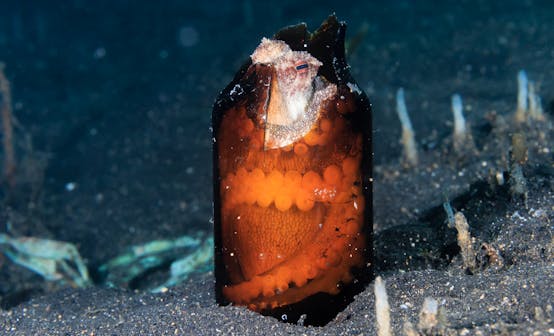
With 9 brains and 8 arms, these agile creatures of the sea are able to coordinate and complete complicated tasks. The octopus has a central brain and each arm has a brain that controls that arm independently. Researchers discovered, through a series of tests, that each brain can act independently; however, the central brain can also link in to control the octopus’ arms.
Did you know that octopuses also have an amazing memory? Researchers have found that octopuses remember people and places…and they’re not afraid to express how they feel about certain people. From playing tricks on humans to greeting and interacting with us, the intelligence of the octopus can boggle the human mind.
Yes…and no. All octopuses have venom in their beak, which is usually used to stun or kill their prey. Though octopus bites are reported every year, most swell up a bit, hurt for a few days, and are gone before the memory of the experience fades. It has been discovered that octopus venom can penetrate human skin without a bite taking place if prolonged contact is made.
However, the only octopus that presents a threat to humans is the Blue Ringed Octopus. Capable of delivering a potentially lethal dose of venom with just one bite, though beautiful, this is one 8-arm friend we give plenty of space and respect.
Since most octopuses tend to avoid humans, bites from all species are rare and typically provoked. Additionally, most species of octopus display defensive behaviors including trying to make themselves look as big as possible, ejecting ink and running away, and hiding. These behaviors typically precede an octopus going in for a bite, so…if you get bitten by an octo, we’re pretty sure you got what you deserved.
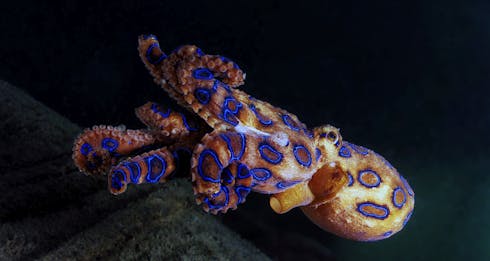
An octopus usually eats crustaceans, other mollusks, and other cephalopods (yes, they are cannibals); however, some will eat fish and prawns. This is often dependent on their habitat and what’s available.
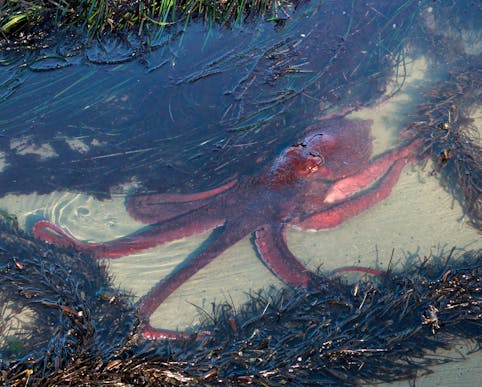
Though they can come out of the water and survive on land for short intervals, octopuses cannot live on land. Some do live in shallow tide pools but all are dependent on their gills for oxygen. So if you do see one of our 8-arm friends wandering the beach at night, they’re likely looking for dinner and will be headed back into the water within half an hour.
Octopuses often hide in dens, cracks, crevices, and sometimes shells. They have adapted to live in every ocean and in every habitat in the oceans from tide pools to the deepest depths. Did you know that a Grimpoteuthis (dumbo octopus) was photographed at 22,825 feet below the surface? Yep. In April of 2019, a camera was deployed to the bottom of the Indian Ocean and this adorable octopus got its picture taken.
Territorial, most octopuses tend to live in the same area for the duration of their life. Whether they’re hanging out in tide pools, setting up a den on a reef, or drifting in pelagic waters, these sea creatures appreciate alone time.
These weird and wonderful creatures have been the center of sailor’s stories for centuries, seeming to originate with the tale of the Kraken who, as folklore has it, would wrap its arms around a ship and take it to the depths of the ocean.
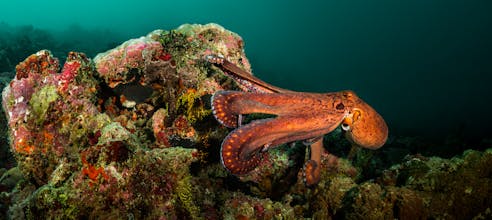
Much has been learned about the octopuses and scientists continue to observe and study these amazing and wonderful ocean dwellers. Though much has been learned, we are still discovering just how smart, funny, and mischievous the octopuses truly are.
Adapting to all ocean environments, including all depths of the ocean, these cephalopods leave us in awe. From taking along their shelter to playing tricks on humans, the octopus easily captivates the curious onlooker. And if you’re lucky enough to have one interact with you, take that moment. Though these 8-arm creatures prefer a solitary life, they are quite curious. An interaction with an octopus, even if you’re just observing it in its natural habitat, will leave you with an amazing memory.
Octopuses typically have eight arms. Each arm is lined with suckers that help them grasp and manipulate objects.
Yes, octopuses are famous for their ability to change both color and texture. They achieve this through specialized cells called chromatophores in their skin, which allow them to blend into their surroundings and communicate with other octopuses.
Yes, octopuses have excellent eyesight. They have highly developed eyes that allow them to see in color and have a sophisticated visual perception. Their eyes are similar to those of vertebrates in terms of structure and function.
Octopuses have several defense mechanisms. They can use their ability to change color and texture to camouflage and avoid detection. If threatened, some octopuses may release a cloud of ink to create a smokescreen, enabling them to escape from predators.
Yes, octopuses have the remarkable ability to regenerate lost arms. If an octopus loses an arm due to injury or predation, it can regrow a new one over time. This process is known as autotomy and is a unique feature of many cephalopods.